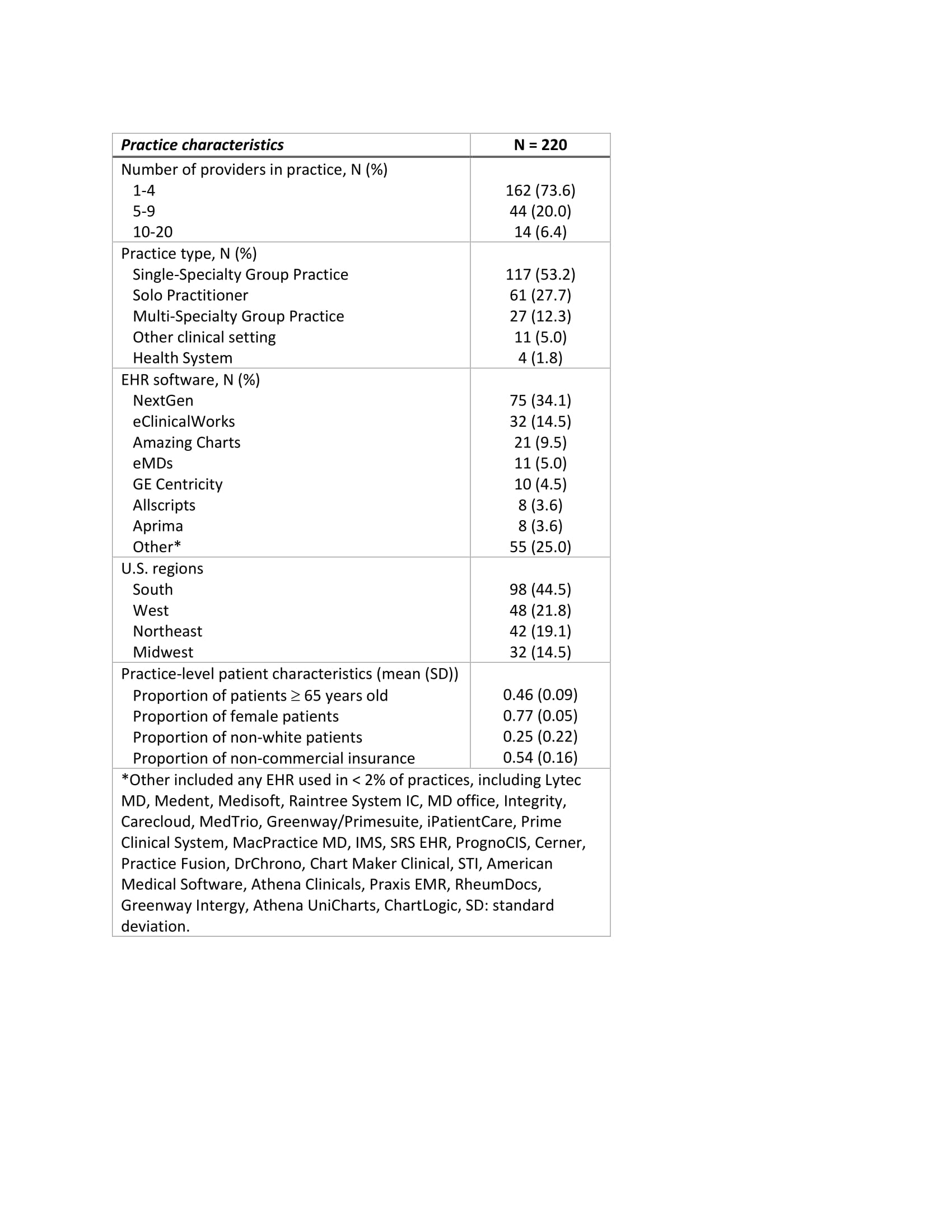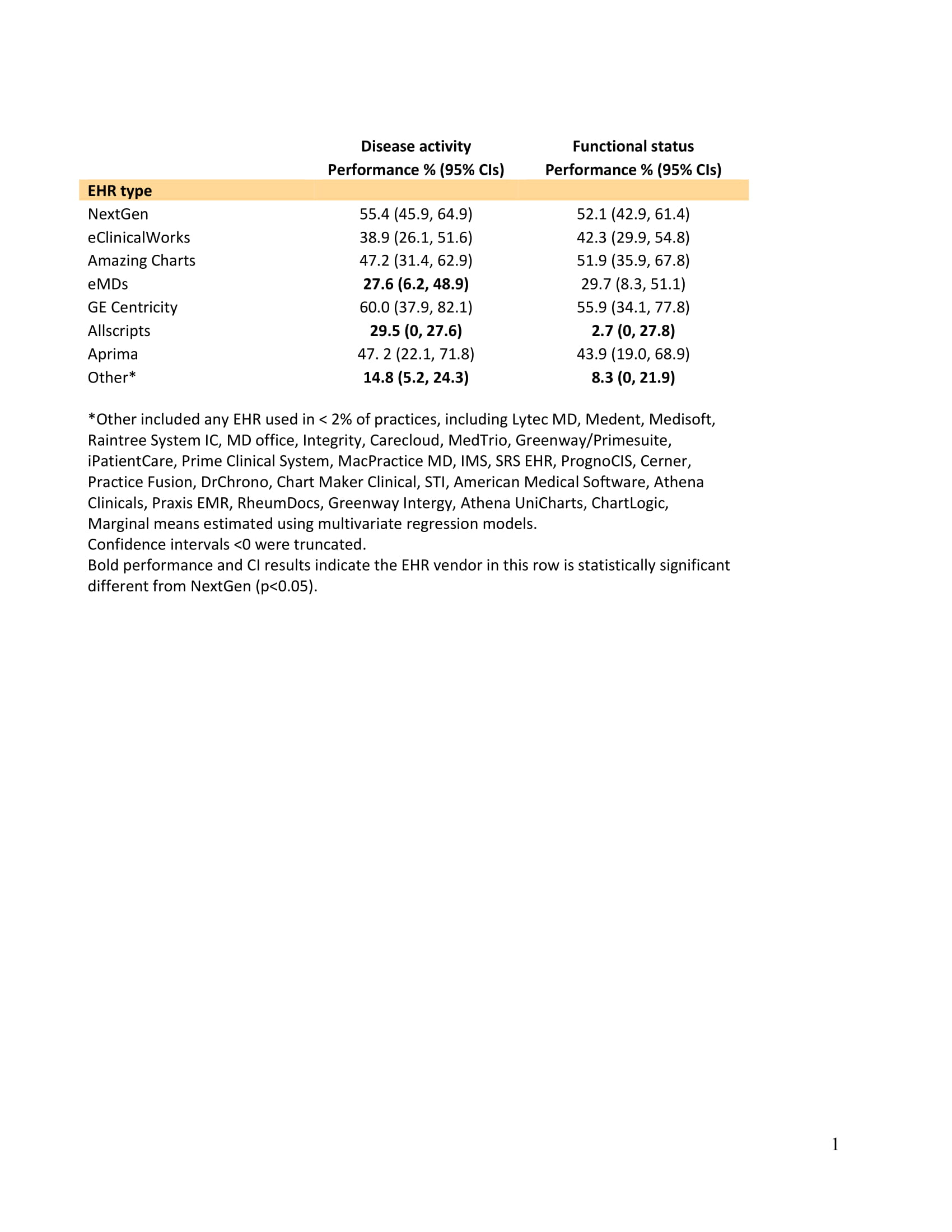Session Information
Session Type: Poster Session D
Session Time: 9:00AM-11:00AM
Background/Purpose: Routine collection of disease activity and patient reported outcomes (PROs) such as functional status assessment in rheumatoid arthritis (RA) are nationally endorsed quality measures and an important component of tracking outcomes and improving care. However, little is known about the health information technology barriers and facilitators to the routine collection of disease activity and PROs in rheumatology practice: there may be features of specific electronic health record (EHR) systems used by rheumatologists that facilitate collection of RA outcomes. Using the American College of Rheumatology’s RISE registry of practices across the U.S., we analyzed the relationship between EHR type and performance on RA disease activity and functional status quality measures.
Methods: We analyzed 2018 data from practices enrolled in RISE. Our primary outcome was practice-level performance on 2 quality measures: (1) Disease activity assessment for patients with RA (the percentage of patients in a practice whose disease activity was assessed using a standardized tool at ≥ 50% encounters during 2018); (2) Functional status assessment for patients with RA (the percentage of patients in a practice whose functional status was assessed using a standardized tool at least once during 2018). Multivariable linear regression models were used to examine the independent effect of EHR type on practice-level performance after adjusting for practice characteristics (practice type, size, and geographic region). To account for differences in case mix, we also adjusted for aggregate characteristics of patients seen in the practice (proportion of patients≥65 years, proportion female, proportion non-White, and proportion with non-commercial insurance).
Results: We included 220 practices who cared for 314,793 patients; the median (IQR) number of patients per practice was 982 (397, 1993). Most were single-specialty group practices (53.2%). NextGen was the most commonly used EHR vendor (48.1%), followed by eClinicalWorks (15.8%; Table 1). Overall, mean (SD) practice-level performance was 39% (37) for disease activity and 34% (38) for functional status. Even after adjusting for practice characteristics and patient case mix, performance on disease activity and functional status assessments was dramatically lower in some practices with less commonly used EHRs (Table 2).
Conclusion: Among practices participating in RISE in 2018, we found significant variation in performance on RA disease activity and functional status PRO measures across EHRs, even after adjusting for practice characteristics and case-mix. Although a causal relationship cannot be determined here, future research should investigate whether features of EHRs that facilitate rheumatology practice, such as the ability to enter PRO data into structured fields, may facilitate higher quality of care. Sharing features and developing rheumatology-specific standards for EHRs could help promote the routine collection of RA measures, which in turn could improve RA outcomes.
Disclaimer: This data was supported by the ACR’s RISE Registry. However, the views expressed represent those of the authors, not necessarily those of the ACR.
Keywords:
EHRs, quality measures
 Table 1. Characteristics of practices in the RISE registry.
Table 1. Characteristics of practices in the RISE registry.
 Table 2. Association of EHR type with PRO documentation.
Table 2. Association of EHR type with PRO documentation.
To cite this abstract in AMA style:
Hammam N, Schmajuk G, Li J, Evans M, Kay J, Yazdany J. Relationship Between Electronic Health Record Vendor and Performance on Patient-reported Outcome Quality Measures in the ACR’s Rheumatology Informatics System for Effectiveness (RISE) Registry [abstract]. Arthritis Rheumatol. 2020; 72 (suppl 10). https://acrabstracts.org/abstract/relationship-between-electronic-health-record-vendor-and-performance-on-patient-reported-outcome-quality-measures-in-the-acrs-rheumatology-informatics-system-for-effectiveness-rise-registry/. Accessed .« Back to ACR Convergence 2020
ACR Meeting Abstracts - https://acrabstracts.org/abstract/relationship-between-electronic-health-record-vendor-and-performance-on-patient-reported-outcome-quality-measures-in-the-acrs-rheumatology-informatics-system-for-effectiveness-rise-registry/
